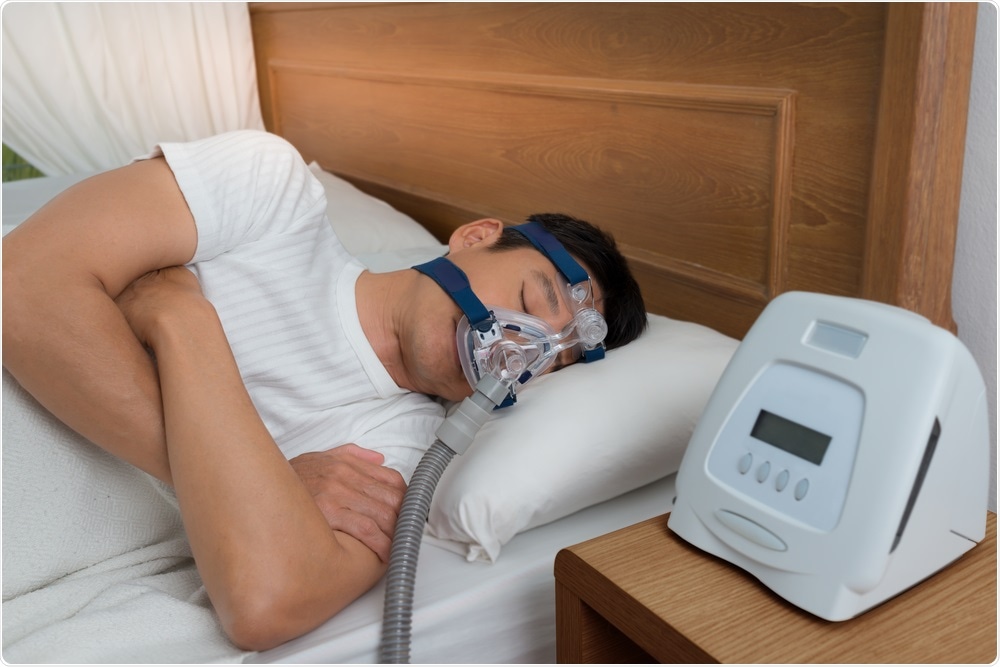Doctors already know that weight loss can be an effective treatment for improving sleep apnea, although the reasons for this have remained unclear. Now, new research has uncovered that a reduction in tongue fat is the key to why fat loss helps in instances of Obstructive Sleep Apnea (OSA).

Image Credit: Sbw18/Shutterstock.com
MRI reveals how a reduction in tongue fat lessens the severity of OSA
A team of researchers from the Perelman School of Medicine at the University of Pennsylvania carried out a study where they measured the impact of weight loss on the upper airway, using magnetic resonance imaging (MRI), collecting data from obese patients. Their findings, which were published in the American Journal of Respiratory and Critical Care Medicine last week, revealed that the reduction in tongue fat that accompanies overall weight loss is the primary factor reducing symptom severity in OSA.
While 22 million Americans have sleep apnea, effective treatment options are limited
Roughly 22 million Americans suffer from sleep apnea, which causes people’s breathing to stop and start while they are sleeping, resulting in sufferers repeatedly waking throughout the night, detrimentally affecting their sleep and overall health due to continued sleep disturbances. Symptoms of the disorder include loud snoring, waking with a sore or dry throat, waking with choking or gasping sensations, morning headaches, and sleepiness during the rest of the day. It is also linked with an increased risk of suffering from high blood pressure and stroke.
Obesity has long been determined as the primary risk factor for developing sleep apnea, although other factors such as having enlarged tonsils, or a recessed jaw are known to play a role also. Current treatments focus mainly on the use of continuous positive airway pressure (CPAP) machines, although they have only been found to be useful in around three-quarters of cases, with 1 in 4 struggling to tolerate the machine. Other than using the machine, doctors can offer upper airway surgery in some cases, however, as with all surgery, this carries risks. Therefore, the development of alternative, effective methods of treatment is desperately needed.
In 2014, researchers found that obese patients, suffering from sleep apnea, also had significantly larger tongues. For the first time, the underlying reason why weight loss has proven to be an effective treatment for OSA was hinted at. The increase in tongue fat that is associated with obesity was a likely factor in sleep apnea.
The new study conducted by US scientists aimed to gather evidence to determine whether this was, in fact, the case. 67 patients with mild to severe obstructive sleep apnea as well as a body mass index greater than 30 were recruited for the six-month study that compared the volumes of the pharynx and abdomen before and after diet or weight loss surgery to reduce patients’ body weights by 10%. MRI scans alongside statistical analysis were able to determine the reductions in tongue volume, showing that a reduction in tongue fat volume was the primary factor linking weight loss with improvements in sleep apnea.
Also, data from the study revealed that reduced volumes in the pterygoid (a jaw muscle that controls chewing) and pharyngeal lateral wall (muscles on the sides of the airway) were also associated with overall weight loss, linking to improvements in sleep apnea, but to a lesser degree than reductions in the volume of tongue fat.
What the team discovered with their new study is likely to open new avenues, exploring new, more effective treatments. The researcher's highlight that more studies will likely follow, aimed at figuring out how diets can be amended to help target a reduction in tongue fat, also looking into whether cold therapies, similar to those that are effective at reducing stomach fat, could be effective in targeting a reduction in tongue fat.
Journal reference:
Wang et. al,. 2020, Effect of Weight Loss on Upper Airway Anatomy and the Apnea Hypopnea Index: The Importance of Tongue Fat, ATS Journal, DOI: https://doi.org/10.1164/rccm.201903-0692OC